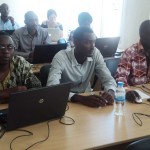
My spring break involved an intense research trip to Rwanda with Hollie Nyseth Brehm, but we reserved the last day for something fun: a methodology workshop for researchers at The National Commission For The Fight Against Genocide. We gave a whirlwind presentation from 9-12, then held office hours to address specific projects. I worried we wouldn’t get much traffic, but the researchers had so many sharp and important questions that they kept us hopping all afternoon.
With so much recent hand-wringing over the relevance and impact of social research, it was inspiring to connect with researchers squarely addressing problems of unquestioned importance — understanding a genocide that took a million lives, investigating and ameliorating its effects on survivors, and working to prevent its recurrence within and outside Rwanda. So I began by asking, “Whose research is more important than yours?” and then stressed the central role of design and methodology in getting it right.
The researchers were super-smart and accomplished but came to us with varying levels of methods training. We therefore emphasized building a strong foundation: posing tight research questions, theory and conceptualization, levels of analysis, data and valid measures, sampling difficult-to-study populations, criteria of causality, research ethics and positionality, publishing and dissemination, and specific issues in interviewing, comparative and historical analysis, and univariate, bivariate, and multivariate statistical analysis. That’s a lot for a semester, let alone a half-day workshop. Throughout, we discussed the importance of humility in doing good research — listening, learning, and keeping an open mind. As is often the case in teaching, we were humbled by the collective expertise and dedication among the researchers. On the subject of “sensitive interview questions,” for example, I turned the microphone over to a participant who had just finished a set of interviews that were an order of magnitude more sensitive than any I’d conducted in my research career.
We can’t say whether or how our little methods session might affect the Center’s research, but Hollie and I certainly gained much from the experience. Yes, we “know stuff” as social scientists, but we have also developed a wonderfully useful set of tools for acquiring this knowledge. And once researchers understand the basic idea of something like multistage cluster sampling, they can often make thoughtful design choices that yield better research with fewer resources. It may seem too obvious to mention, but many of our methods discussions within the field seem devoted to “tweaking and critiquing” more esoteric designs and models. So it is both refreshing and empowering to share some of the methodological foundations of our field with such sharp and motivated researchers.

Comments 2
Letta Page — April 1, 2014
Every time I read this title, I think it says "Twerking and Critiquing." Can't say it changes the article... plus it makes me giggle!
Friday Roundup: April 4, 2014 » The Editors' Desk — April 4, 2014
[…] “There’s More to Methods than Tweaking and Critiquing,” by Chris Uggen. On why it’s refreshing to return to talking about methods as the tools of social science. […]